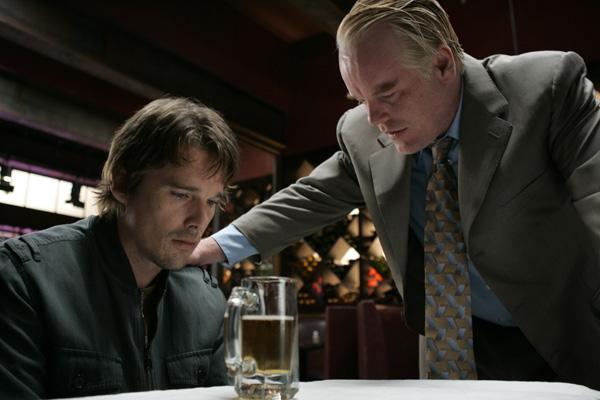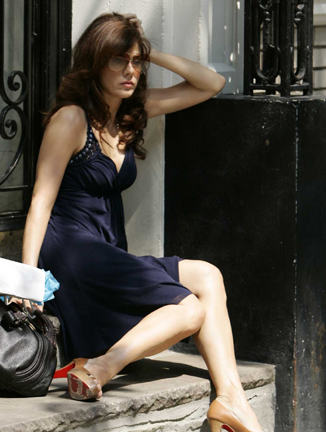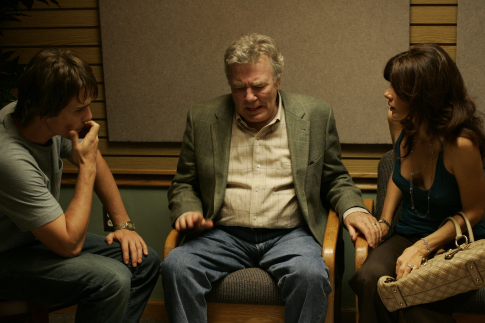On the occasion of the great Philadelphia-born and New York-bred director Sidney
Lumet's passing earlier this year, The Film Society of Lincoln
Center put together an extraordinary retrospective of
16 signature classics, Prince of the City: Remembering Sidney
Lumet which was held in the Walter Reade Theater from July 19 -
July 25, 2011. It culminated in the closing screening of Lumet's
powerful last feature, Before the Devil Knows You're Dead.
A melodramatic thriller stoked with dark humor and darker dread, Before
the Devil... first premiered in the U.S. at the 2007 New York
Film Festival. Its director had long been regarded as an
internationally respected auteur that had made several benchmark
films such as The Pawnbroker, Prince of the City and Network,
as well as the two Al Pacino star vehicles, Serpico and Dog
Day Afternoon.
Just as Before the Devil was getting all the ballyhoo,
Lumet regaled a posse of journos with insights and asides on his
latest effort. Only the Devil himself could have commanded more
respect. It was not only for the film's brilliant and unique story
structure or its sterling cast (Philip Seymour Hoffman, Ethan Hawke,
Albert Finney, Marisa Tomei and Amy Ryan), but for Lumet's
application of HD video cameras.
Before the Devil details
the tragic tale of two brothers who organize the robbery of their
own parents' jewelry store. The job goes horribly wrong, triggering
a cascading set of events that sends them, their parents and
their friends and lovers careening towards a disastrous climax.
 Little
did we know at the time that it would be his last press day
or his
last film. On April 9, 2011 the seemingly indefatigable Lumet died
at 86, after a long career as an actor/writer/director who made over
50 films many garnering Oscar wins or nominations
for their actors.
Little
did we know at the time that it would be his last press day
or his
last film. On April 9, 2011 the seemingly indefatigable Lumet died
at 86, after a long career as an actor/writer/director who made over
50 films many garnering Oscar wins or nominations
for their actors.
The son of Yiddish thespians, Lumet began acting at age four, made
his Broadway debut at 11 and first film appearance at 15. But it was
as a director first in early live television and later in movies
that he found his true calling, drawing on his experience in front
of the camera to become the very definition of an actor's
director.
From 12 Angry Men in 1957 to Before the Devil Knows You're
Dead, the Philadelphia-born Lumet was, in the words of Woody
Allen, the quintessential New York filmmaker, whether telling
gritty stories of urban corruption or adapting Broadway stage
classics in cinema.
Here now is that last roundtable interview, published for the first
time in its entirety.
How well rehearsed were the actors for this film? Did you do a lot
of takes for the more challenging scenes? Or was it just straight
ahead, one or two takes?
We're very thorough in rehearsal. We do everything. In fact, before
the rehearsal ends, we do a run-through from top to bottom fights,
anything, everything. The scripts are out of their hands. It's a
very thorough preparation. I'm a big believer in it.
From start to finish?
Start to finish. Everything is covered every day, because first of
all, it's the only time they can do it in sequence. They'll never
get it in sequence again. Second of all, when you're going to ask
for this level of intensity, you're not going to get it if they're
insecure in any way. If they're tight, the rehearsal just relaxes
them completely because they get to know what they're doing. It's
that that allows all of the emotion to come jumping out and
springing to the fore. Yeah, I find it invaluable.
 Why
did you think of Marisa Tomei for Gina the wife of Phil Hoffman's
character?
Why
did you think of Marisa Tomei for Gina the wife of Phil Hoffman's
character?
I fell in love with her in My Cousin Vinny and it hasn't
abated a bit. A superb actress. When I met her after My Cousin
Vinny, I couldn't believe it, because I thought she was that.
Every once in a while you see a performance and say well, the
director went out and got a nonprofessional, and I thought that was
true of Marisa. I thought it was true of Tim Robbins in Bull
Durham, and I thought, my God, they went out and got themselves
a real cracker. So I loved her work from that and some subsequent
work.
Also this is very important for a picture like this if you know
my pictures, I don't do sex scenes. I don't do sex scenes because I
don't believe them. Only one picture I ever believed in [doing it],
and there was a reason I believed, but I knew I was going to have to
have it in this, that opening scene. It was very important that both
actors be relaxed about it, because if they weren't then it would be
like any other sex scene, the ones I don't believe. And I knew that
Marisa just is totally uninhibited. She's not an exhibitionist by
any means, but it's just another part of acting for her. And I'm
sure that Philip is not used to it because he's not the conventional
leading man.
When we were blocking this is during rehearsal, after we'd
finished three days around the table talking and so on then we got
up on our feet, we started to stage it just like you would in the
theater. So that's the first scene, the first one we get to, and
there's a set laid out on the floor and a bed. Marisa, bless her,
she hops onto the bed. I wrote out the description very carefully,
because there are instances of actors saying, "Oh I didn't know I
was going to have to get undressed," and by union regulations you
cannot make them. I wrote it out in great detail so that they
couldn't say they didn't know. So Marisa hops onto the bed, gets up
on her knees and on her elbows and slaps her ass and says, Let's
go, Phil! It was so great because it not only put it in its proper
place which is part of the movie, part of a performance but for
Philip, that must have been such a release and such a relief that
there was nothing competitive or what-have-you.
That took all the stress out of it.
Absolutely. I was thrilled with her. I was thrilled with her.
How do you bring that essence out of an actor?
It varies picture by picture. Another big variable in it is that
some actors are in themselves closer to the roles they're playing
and some actors are farther away. Here, the most important thing
there was to work on was the intensity, because like all good
melodramas the story is completely unbelievable. The only thing
that's going to create a belief is if the intensity of performance
is so high that your audience can't deny it, that you're sucked in
completely. So for these actors it was a question of getting up onto
a high enough pitch in the inner life of the performance.
You worked with Albert Finney (who plays the father) in Murder
on the Orient Express 33 years ago. Did you talk about the
differences and similarities of working with him back then and
working with him now?
Never. I don't even see my old movies, an old movie is anything I
did last. When this round is over with and the premieres that I have
to go to, and so on, I won't see this again. Next Wednesday is the
last time I'm going to see this movie.
 You've
shot all your movies with multiple cameras. This one seemed to be
very much a stationary camera looking into these lives. Was this
something very conscious that you wanted to do or something very
different from your older movies?
You've
shot all your movies with multiple cameras. This one seemed to be
very much a stationary camera looking into these lives. Was this
something very conscious that you wanted to do or something very
different from your older movies?
I never think of the camera work as separated from the picture
itself. One of the reasons I love high def I think in high def
is because multi-camera has become much simpler. For me that takes
me right back to my origins, that takes me right back to live TV,
because there I'd be using as many as six cameras. So it was a
terrific pleasure. I love high def anyway; I've worked in nothing
else for the last five years.
What was similar or different about making this film?
The multi-camera use. For instance, in two scenes, there's one
camera there. There's one camera there. This camera's covering him.
This camera's covering him. Look, you can get anything you want to
in normal film, I realize that; it's a question of the effort. Take
a scene like where Ethan and Philip are ripping off the dope
dealer's place and Philip has just shot that stranger lying there in
the bed and he's rifling stuff in the closet, and Ethan is just
standing there petrified this tension begins between them. "Did
you touch anything?" "What?" "Did you touch anything!"
I guess I could have gotten that with individual cameras, first one
side, then the other, but two things: it would have taken me all day
to build up to that level of intensity, number one; and number two,
I still don't think they ever would have been able to seem like they
were working out of each other so completely. Each one of them was
in perfect reaction to what the other person was doing because they
were doing it together at the same time. All pieces of work you kind
of keep hoping for the good accident and it happened when Philip
stuck his head out and he said, "Okay, are we good?"
Now that wasn't in the script. Extraordinary line, extraordinary
reaction. Also from a character point of view, because for the first
time, the only time in the movie, Philip is the insecure one and
Ethan is the secure one. That inversion is just so humanizing to
those two characters. A complete accident and I think it only could
have happened if both of them were being recorded at the same time.
If that had happened on Philip's side and he'd thrown that in and
then two hours later I'd turned around and gotten Ethan's side, I
don't think he ever would have gotten to that reaction.
That's a fascinating perspective that only a good director would
have. You actually wrote a draft of the film. You didn't take a
writing credit?
No. I would have loved one, but those things are decided by the
Writer's Guild. I don't know what they use as judgment, but they are
very suspicious and rightly so of directors who put their names
on as writers as well. Because the normal amount that I do on a
script I wouldn't think of asking for a credit for. The writer may
have written the battle happens and the North wins, and then the
director, because he'll stage the battle, he'll ask for a writing
credit and I don't think he should get it.
How hard was it to get this one made?
I don't know. It's a peculiar time in movies now because there's so
much private financing in it, and I don't know what Michael [Cerenzie,
the producer] had when he sent me the script. I don't know how much
money he had lined up, and when the last of it clicked into place.
With a small movie like this, Oscars are a different game now; it's
changed a lot. Now you have to campaign for them.You've had so
many Oscar-nominated and award-winning movies. How important are
awards to movies like this?
I have no idea. It's like catching lightning in a bottle. I don't
think you can ever figure on it. I don't aim anything for it. The
reason it's all so much more a sales job now, and ads and this that
and the other in the old days when you were working at 20th
Century Fox, Darryl Zanuck sent you a note saying, Vote for this
picture. Literally... So your vote was decided for you.
How would they know what you'd voted for?
They knew.
It's amazing that you've made nearly 50 movies in your 83 years.
This movie is so great and to come out at this time in your life.
Will you continuing making movies after this?
I hope so. With a little luck, with a little help from my friends,
yeah.
Email
us Let us know what you
think.